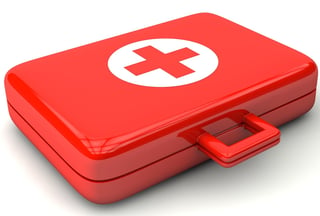By Emily Lord, executive director, HealthCare Ready
The Louisiana floods in August of 2016 destroyed more than 60,000 homes and forced more than 15,000 people into shelters at the height of the disaster. These floods were not caused by a massive hurricane like Katrina in 2005 but by tons and tons of rain. No one expected rain to cause the damage on the scale it did. It is a powerful lesson that we need to always be prepared to protect ourselves and those we care for, especially the elderly who are more vulnerable than most because of limited mobility and additional health care needs.
While disaster preparedness sounds overwhelming and yet another thing to add to your to-do list, there are easy, low cost ways to protect the health of your family or those to whom you provide care.  There are many organizations that provide preparedness training and toolkits, including the American Red Cross and the CDC, but they don’t always include health care preparedness. Here are a few key things to think about when planning.
There are many organizations that provide preparedness training and toolkits, including the American Red Cross and the CDC, but they don’t always include health care preparedness. Here are a few key things to think about when planning.
- Knowledge is power. The most important thing you can do is write down in one place (or send yourself an email) the most critical medical information that you won’t have time to think about during a disaster. Include things such as:
- Doctors and their contact information
- Medicine lists – Healthcare Ready provides a free printable medicine card to keep all critical information in one place
- Important health information like chronic diseases and allergies
- Keep supplies on hand. Do you already shop at warehouse clubs or discount stores to buy bulk paper towels? Make sure you get batteries and water too. Here’s a good list of some things you should always have ready, which includes a 7-day supply of medication. Be sure to refill your prescriptions as soon as you can to help make sure you have extra medication on hand; it can make the difference between being safe for a few days or having to rush to a hospital.
Many states lift refill limits in times of disaster so you can get the medicines you need. However, for those working in hospice or with patients who require pain meds, it can be much harder to replace those quickly.
It’s also important to note, if you are caring for someone with a medical device that needs power, make sure you keep a spare battery around. If someone is trapped at home with no power or forced to evacuate, it can make all the difference in the world.
- Plans. When you lose power for a night it’s inconvenient but something you can typically wait out. However, what if you lose power for a week? Or two? And what if the phones are out as well? Knowing what you would do and how you would help those you care for can reassure older adults feeling scared and alone during a disaster. Consider making one plan if someone can’t leave their home and another if they have to evacuate. Also remember:
- If you get separated, FEMA and the Red Cross both have programs to reunite families
- All Red Cross shelters will take people with disabilities and/or chronic care needs. While they don’t provide direct medical care, they can help with things like medicine and device replacement.
- Get smart. If something happens in your community, there will be information shared from myriad sources – not all of it accurate. The confusion that happens in a disaster can make it difficult to get the full story for at least a few days – so know which sources to trust! Keep the following resources in mind:
- Your local emergency management agency will be sharing information, and most do a fantastic job of sharing real-time updates on Twitter
- Many cities have alert sharing programs that email or text important information
- In times of a large disaster, Healthcare Ready has Rx Open, which shows you which pharmacies are open
A disaster can strike at any time – often with little or no warning. That’s why it’s important to have a plan in place for you and your loved ones. A few proactive steps can be a true lifesaver in the wake of an emergency.
Emily Lord serves as the executive director of Healthcare Ready, a nonprofit organization dedicated to strengthening health care through public private collaboration and addressing pressing issues before, during and after disasters and disease outbreaks.
![Duel-Logo-CFC-AYS[rgb]](https://blog.comforcare.com/hs-fs/hubfs/Duel-Logo-CFC-AYS%5Brgb%5D.jpg?width=525&name=Duel-Logo-CFC-AYS%5Brgb%5D.jpg)